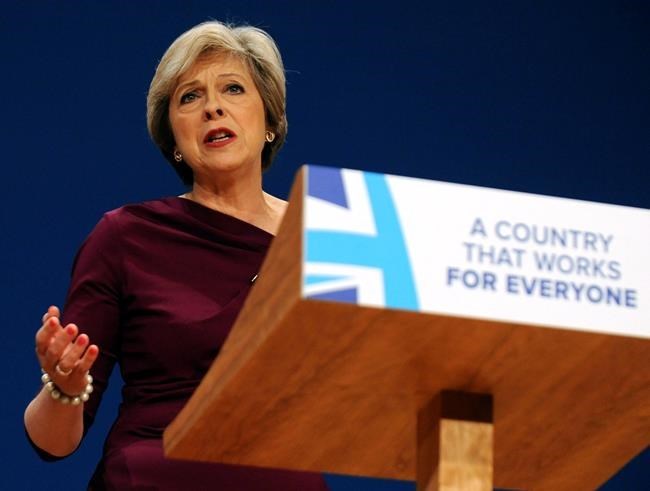
FILE - In this Wednesday, Oct. 5, 2016 file photo, Conservative Party Leader and Prime Minister Theresa May addresses delegates at the Conservative Party Conference at the ICC, in Birmingham, England. The pound has dropped more than 5 percent against the dollar since Oct. 2, when Prime Minister Theresa May announced plans to start formal talks on exiting the European Union by the end of March. (AP Photo/Rui Vieira, file)
October 11, 2016 - 10:38 AM
LONDON - Family business owners like Stephen Bowles say the timing of the pound's plunge couldn't be worse.
The freight hauler, whose family business operates at Heathrow, Europe's largest airport, says a resulting five-pence per litre increase in the price of fuel for his 40-truck fleet will add as much as 50,000 pounds ($62,000) a year to his costs. Plus it comes as his trucks start to import goods for the Christmas holidays.
"It's the busiest time of the year," he said, adding that the extra cost will ultimately be reflected in higher prices for the goods he transports. "These costs have got to be passed on. They have got to be passed on now."
The pound has dropped more than 5 per cent against the dollar since Oct. 2, when Prime Minister Theresa May announced plans to start formal talks on exiting the European Union by the end of March. Her rhetoric so far suggests the government will try to restrict the flow of EU immigrants, which may mean losing tariff-free access to the single market — a big blow to many British companies.
The currency market didn't like that at all. And things got worse a few days later when French President Francois Hollande promised the EU wouldn't make it easy on the U.K.
The British currency is now down more than 18 per cent against the dollar since June 23, when voters backed leaving the EU. The pound traded as low as $1.2130 on Tuesday, down from $1.4879 on the day of the referendum.
All of this matters to British consumers because a weaker pound means importers will have to pay more for goods purchased abroad, and they are expected to pass those costs onto customers.
"We will see that first with goods like perishable foods, items such as bread, eggs, and milk," said Daniel Vernazza, the lead U.K. economist at UniCredit, "The weekly shop will increase. The cost of filling up your car will increase, and the like, and the costs of holidays, a whole range of goods and services."
Those costs are likely to start edging up on perishable goods and fuel either right away or in the coming days. Holidays abroad are automatically more expensive as the pound has dropped against the destination country's currency. But the full effect of inflation on the broader range of goods and services comes in after a year or more, when costs filter through the supply chain, where importers and exporters use contracts that cover months at a time.
"Someone is going to pay for it in the end, and it's going to be you and me doing the shopping on the weekend," said Bowles.
The Bank of England, in a quarterly report released in August, said "large falls in (the pound) will push up U.K. import prices, which will be passed through to consumer prices in coming years." That is likely to push annual inflation above the bank's 2 per cent target level, though it will drop back to the target by late 2017, the bank said.
The situation will put the Bank of England in a bind. It trimmed its key interest rate to a record low 0.25 per cent this summer to stimulate the economy. But low rates help weaken a currency, and the prospect of inflation rising faster than expected could see it have to change course and either hold off more rate cuts or even raise interest rates in coming months. The downside is that would make mortgages more expensive and stifle economic growth.
The good news is that inflation is rising from a low level: a mere 0.6 per cent in September. But that is cold comfort for consumers, who stand to see the cost of living rise steadily.
Some economists predict that the inflation rate will increase to an average of 3 per cent in 2017 and 2018. But if the pound weakens more — to say $1.10 — consumer price inflation could average 4 per cent in 2018, says Samuel Tombs of Pantheon Macroeconomics.
It could get worse. Britain is particularly dependent on foreign investment. The current account — the broadest measure of international trade in an economy — was in deficit by 5.4 per cent of gross domestic product last year, the largest since records began in 1948. That means that the country imported and brought in more investments than it exported and invested abroad.
"(The pound) is now extremely volatile, and the large current account deficit suggests that it will fall further if overseas investors become more concerned that the U.K. government will opt for a hard Brexit," he said.
News from © The Associated Press, 2016